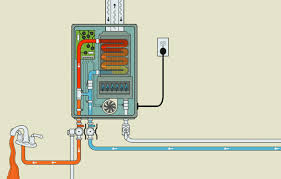


Storms can be unpredictable and destructive, causing major issues for your home’s essential systems. From high winds to heavy rain, your heating, cooling, plumbing, and electrical power can all take a hit. Here’s what you need to know and how to stay prepared.
How to Protect Your HVAC System:
How to Prevent Plumbing Issues:
How to Stay Powered Up:
Don’t wait until the next storm hits—prepare your home today. Whether it’s HVAC maintenance, plumbing checks, or installing a backup generator, Crossville Heating and Cooling is here to help. Call the fastest team in town and stay ahead of storm damage!

Plumbing emergencies include water leaks, burst or damaged pipes, and sagging or discolored ceilings. They also cover low water pressure, overflowing toilets, and clogged drains. Other issues are water heater failure, gas leaks, and sewage backups.
These problems can cause a lot of water damage, health risks, and safety issues. They need quick action by a professional plumber.
You'll often find the main water shutoff valve in the basement, crawlspace, or near the water heater. It might also be on an exterior wall or in the yard.
Yes, mini split systems can both heat and cool your home. They switch the refrigerant flow to move heat from one place to another. This can either cool the indoor air or warm it up.
It's important to fix plumbing problems fast to prevent water damage and mold growth. These issues can harm your home's structure and your family's health. Waiting can lead to expensive repairs later.
There are two main types: gate valves and ball valves. Ball valves are better because they're reliable and easy to use.
A mini split system, also known as a ductless HVAC system, moves heat from one area to another. It doesn't need ducts and keeps your house warm or cool everywhere.
Look out for wet spots on floors or walls, discoloration, and sounds of running water. These signs mean you might have a serious water leak. Ignoring it can cause more damage, mold, and structural problems.
To shut off the valve, turn the handle or lever clockwise until it stops. For gate valves, turn the circular handle clockwise. For ball valves, turn the lever 90 degrees to the water line.
The outdoor unit controls the refrigerant flow to the indoor air handlers. This decides whether to heat or cool the air. Then, the indoor units circulate the air in the room.
A burst pipe can spill hundreds of gallons of water quickly, damaging walls, floors, and furniture. It's often caused by freezing, corrosion, or high pressure. You need a professional plumber right away.
If it's stuck, use channel lock pliers to gently tighten the packing nut. If leaking, tighten the bleeder valve with your fingers or pliers. If it still leaks, you might need a new valve from a professional plumber.
Mini splits give you control over different areas of your home, save energy, run quietly, and can both heat and cool.
Sagging or discolored ceilings suggest a hidden water leak. This can lead to structural damage and mold growth. These signs mean water has been leaking behind walls or ceilings for a while.
Turn it off in a plumbing emergency, like a burst pipe or leaking appliance, to stop water flow and prevent damage. Also, turn it off before leaving for a long time to avoid leaks or flooding.
Mini splits beat traditional HVAC systems by offering precise temperature control, saving energy, and cooling and heating without ducts.
Low water pressure is a problem if it affects many faucets or fixtures. It can be caused by a failing pressure regulator, clogged pipes, or municipal water issues. This needs quick action.
If you can't find the valve or it's stuck, call a professional plumber. They can find the valve, even if it's hidden, and replace a faulty one.
Mini split systems are very energy-efficient, often using 60% less energy than standard electric heating. Many are ENERGY STAR certified, meeting strict energy-saving standards.
Try using a plunger or turning off the water supply to the toilet. But if it keeps overflowing, call an emergency plumber. They can fix it before more damage happens.
Keep it working well by checking and maintaining it regularly. Turn the valve on and off to ensure it moves easily. Watch for leaks or corrosion and fix them quickly to prevent damage.
Installing mini splits is easy since they don't need ducts. Keeping them running well just means cleaning the air filters regularly.
A broken water heater is an emergency if it has gas leaks or could cause water damage. Signs include no hot water, strange noises, or leaks. Call a plumber if you notice these.
Mini split systems are built to last, usually 15 to 20 years with the right care.






.jpg)





